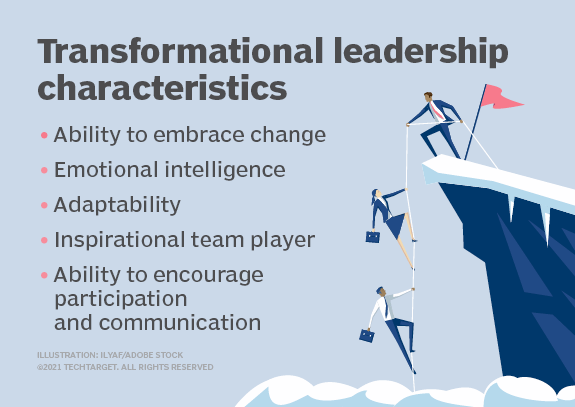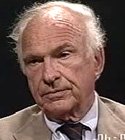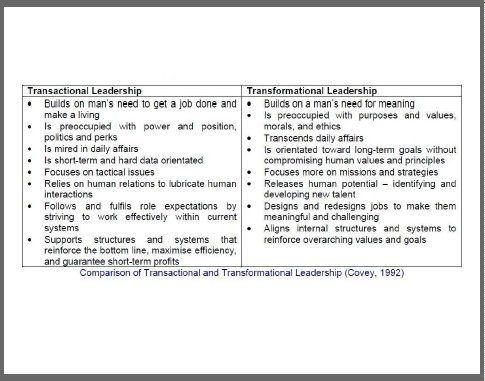|
Transformational Leadership TheoryLeadership with values, meaning and a higher purpose
Transformational leadership theory has evolved from and contains elements of preceding leadership types, such as trait and behaviour theories, charismatic, situational and transactional leadership. Transformational leadership theory is about leadership that creates positive change in the followers whereby they take care of each other's interests and act in the interests of the group as a whole. In this leadership style, the leader enhances the motivation, moral and performance of his follower group.
Originally this was in the context of his researches into political leadership, but this term is now used in organisational psychology as well. Macgregor drew the important distinction between transactional leadership and transformational leadership.
The 4 Transformational leadership components
There are four leadership components of transformational leadership theory, which are: (1) Charisma or idealised influence - the degree to which the leader behaves in admirable ways and displays convictions and takes stands that cause followers to identify with the leader who has a clear set of values and acts as a role model for the followers. (2) Inspirational motivation - the degree to which the leader articulates a vision that is appeals to and inspires the followers with optimism about future goals, and offers meaning for the current tasks in hand.
(3) Intellectual stimulation - the degree to which the leader challenges assumptions, stimulates and encourages creativity in the followers - by providing a framework for followers to see how they connect [to the leader, the organisation, each other, and the goal] they can creatively overcome any obstacles in the way of the mission. (4) Personal and individual attention - the degree to which the leader attends to each individual follower's needs and acts as a mentor or coach and gives respect to and appreciation of the individual's contribution to the team. This fulfils and enhances each individual team members' need for self-fulfilment, and self-worth - and in so doing inspires followers to further achievement and growth.
Bernard M. Bass [1985], suggested a transformational leadership theory that added to Burn's original theory - the extent to which a leader is transformational, is measured: (1) In terms of the leader's influence on the followers. (2) The leader success in seeking new ways for working, while he tries to identify new opportunities and assess threats. 8 FREE Introductory Lessons from Practitioners Masterclass - HERE
Applying the theoryTransformational leadership theory is about leadership that creates positive change in the followers, whereby they take care of each other's interests and act in the interests of the group as a whole. Here, the leader enhances the motivation, morale and performance of his follower group.
These are addressed in the "Practitioners Masterclass" which takes a holistic view of the key areas and shows you how to put all this into practise. To equip yourself, stay one step ahead with the tools and processes that will enable you to apply the theory - check out the Practitioners' Masterclass [or click on the image to the right]. James MacGregor Burns - Leadership with a higher purpose Return back to Define leadership Home page
|



 James MacGregor Burns first brought the concept of transformational leadership to prominence in his book Leadership [1978].
James MacGregor Burns first brought the concept of transformational leadership to prominence in his book Leadership [1978]. 





